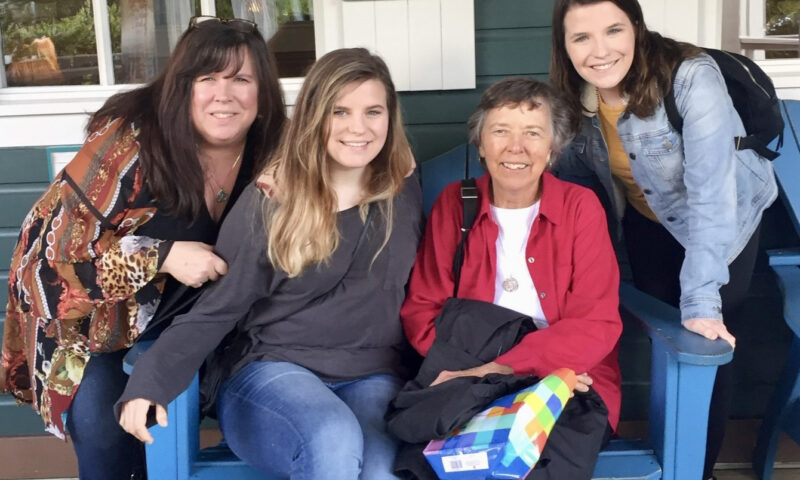(Pictured: Cathy MacCaul (left), her daughters, and her mother, Betty.)
COMMENTARY
By Cathy MacCaul
AARP knows that family caregivers are the backbone of our nation’s long-term care system. In Washington state, 820,000 family caregivers provide $16.8 billion in unpaid long-term care annually, spending an average of $7,200 a year out of their own pockets.
My caregiving journey started early. In my 20s, my parents welcomed my grandmother into our home after my grandfather passed away and she was no longer able to care for herself because of dementia. It was a labor of love, but caring for my grandmother placed an incredible strain on my parents. Providing for her needs meant they had to adjust their work schedules and other sacrifices, which meant I stepped in when I could.
During this time, my mom and I had several conversations about how she wanted to be cared for, considering our family history and the likelihood that she would deal with dementia in her later years. Even so, I never thought I would be the primary caregiver for my mother, but I did know that whatever her health circumstances, she wanted to stay in her home as long as possible.
That knowledge guided me when she ended up hospitalized after complications from COVID. I moved in for what I thought would be a temporary stay until she recovered. Nearly three years later, I live with my mom because she is no longer able to take care of herself. Stepping in as her primary caregiver, my job is to keep her healthy, calm, happy, active, and engaged with her friends. And, while she is strong and capable, there are days when she doesn’t remember who I am or how to make a sandwich.
As the advocacy director for AARP, I know the challenges that caring for a loved one brings to bear. My mom has an in-home care provider who works three to four days a week so I can go to work. I’m also fortunate to work for an organization that provides flexibility when we must step in to care for loved ones. Other workers aren’t as lucky. Too many caregivers – often working women who step in as family caregivers – must reduce hours or step away from a job altogether.
While I am a fierce advocate for my mother, I am also a fierce advocate for older adults. One of the things I have learned over the last 10 years working for AARP is the long-term care system is flawed. There are too many hurdles and barriers to accessing help when you’re a middle-class family. It’s up to all of us to make sure we remove those barriers and hurdles so that families can do what they want: Love and care for their families as long as possible.
Currently, Washington has a program that will provide financial assistance to families when they face serious long-term illness, injury, or disability. Our public long-term care insurance program supports family caregivers who help their older parents, spouses, and other loved ones remain in their homes, where they have told us they want to be.
This November, voters will have a chance to weigh in on ballot initiative 2124, which aims to make this program voluntary. If it passes, it will take away a program that helps families provide care when they need it most. It will also leave families with the choice of paying for care services out of pocket or purchasing expensive, often unattainable long-term care insurance.
At AARP, we have worked steadily since 2019 to improve this program and make sure it is the best it can be. We’ve expanded coverage to near-retirees, and this year, we made the program portable if we move out of state.
This November, AARP is asking you to vote no on Initiative 2124. It hurts working Washingtonians and our families and hinders our ability to care for family members and do what we do best: Be a family.
Cathy MacCaul is AARP Washington’s advocacy director.
ABOUT I-2124
Initiative 2124 would, if passed by voters, allow employees and self-employed individuals to opt out of coverage under WA Cares, the state’s long-term services and supports trust health care program. Someone opting out wouldn’t be required to pay the payroll tax assessed on employees’ wages that funds the program.
Supporters of I-2124 say it allows people to choose, as consumers, whether they want WA Cares. Opponents of the initiative say its passage would take away a source of paying for long-term care.
WA Cares provides long-term health services benefits (home health care, adult day care, nursing home care, and group home care) to qualifying individuals. The first state-operated long-term care insurance program in the country, it was created in 2019 through legislation approved by the Washington Legislature and signed into law by Governor Jay Inslee. Employers were required to begin deducting the tax from paychecks beginning in 2023 with a tax rate of 58 cents per $100 of earnings, meaning an employee earning $50,000 a year would be required to pay $290 per year and an employee earning $150,000 a year would be required to pay $870 per year. Benefits were capped at $36,500 per individual over their lifetime.
Information about WA Cares is available at wacaresfund.wa.gov.

